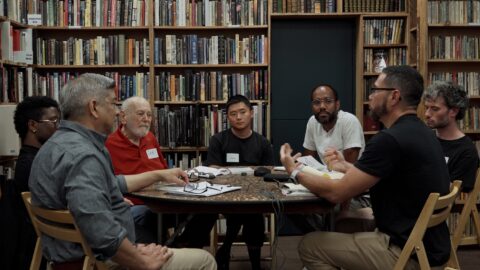In the lead-up to last year’s US election, I decided to go all in on the pressing topics facing America. Articles, podcasts, analysis. CNN. Along the way, I became obsessed with a YouTube channel named Jubilee, which is ostensibly about finding a middle ground between different identity types — Republicans vs Democrats, Fat vs Thin People, Astrologists vs Astronomers, pro-Palestinian activists vs pro-Israeli activists — but is really a showcase for the worst kind of Instagram personalities to flex their rhetorical muscles.
Shouting, insults and stupid, circular “gotcha” arguments are the norm. While somewhat entertaining to watch, and occasionally thought-provoking, the final content rings hollow, with both sides of the topic du jour rarely engaging with what the other person says. But it did show the endgame of identity politics, with right-wingers able to claim the very same victimisation as the people they gleefully want to oppress, thus rendering inert any genuine change. They’re the biggest snowflakes of all, and they used their bogus victim status to win.
Jubilee instantly came to mind while watching the mid-length Gay Men’s Book Club (2025), playing as part of a special focus on artist-filmmaker Matthew Lax. Running at a mere 50 minutes, it’s shorter than many of the bumper-sized YouTube videos and other extended podcasts that swallow up the discourse with their sheer length while simultaneously (and perversely) designed to be listened to passively. Rather, with its very inauspicious nature and deliberately stripped-down aesthetic, it’s a film that invites genuine reflection on what it means to be gay in America today.
The premise is simple: seven gay men in L.A, from diverse backgrounds (Black, Asian, Chicano, immigrant, old, young, etc), sit around a table in a bookshop and talk about the non-fiction book Elite Capture (Olúfẹ́mi O. Táíwò, 2022). It discusses how once-radical concepts, such as identity politics, can be co-opted by the establishment (or say, media platforms like Jubilee) and deployed for the interest of the elites. Gently guided (but not led) by Lax himself, they discuss the relationship between gay culture and neoliberalism, the commodification of Pride and whether the “gay” identity group still means anything in a world characterised by multiple interlocking oppressions. As one of the contributors points out, why does any of this stuff matter if he is in debt?
Shot in 2023, with COVID-19 still sharper in the memory yet a while before the cataclysmic re-election of Trump (perhaps putting identity politics to bed once and for all) it is deeply refreshing due to the empathy the men hold towards one another. Even when one of them channels his inner Robert F. Kennedy Jr, criticising the use of the HIV-prevention drug PrEP, no one calls him out to boost their liberal brand. Instead, the conversation gently meanders across different streams, allowing us to see all men as seven individuals, spanning from young kink educators to the legendary octogenarian gay organiser Don Kilhefner. Equally loose is the camerawork, which is as spontaneous as the conversation, randomly moving between close-ups and wide shots, panning from speaker to speaker without much concern for flow, often re-racking the lens to get everyone back into focus. Jubilee itself has a tighter aesthetic. Yet, what it lacks in professional-grade filmmaking it more than makes up for in heart, asking us to slow down and listen in a world where it feels like everyone else is shouting over each other for clicks.
Redmond is the editor-in-chief of Journey Into Cinema.




